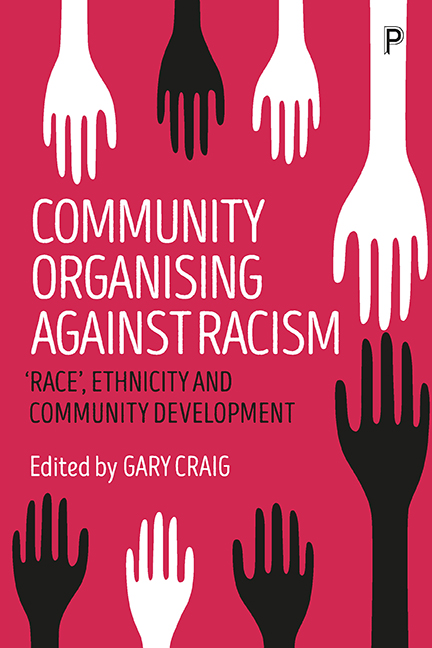Book contents
- Frontmatter
- Dedication
- Contents
- List of figures
- Author biographies
- List of abbreviations
- Introduction
- Section One Community development with ethnic minorities: history, theory, policy
- Section Two Building capacity with BME groups
- Section Three Working with Roma communities
- Section Four Global experience
- Section Five Working across cultural boundaries: ideological and personal reflections
- Afterword: Messages for community development in working with minority groups
- Index
One - BME community engagement in the UK and public policy: a brief retrospective
Published online by Cambridge University Press: 12 April 2022
- Frontmatter
- Dedication
- Contents
- List of figures
- Author biographies
- List of abbreviations
- Introduction
- Section One Community development with ethnic minorities: history, theory, policy
- Section Two Building capacity with BME groups
- Section Three Working with Roma communities
- Section Four Global experience
- Section Five Working across cultural boundaries: ideological and personal reflections
- Afterword: Messages for community development in working with minority groups
- Index
Summary
Introduction
Ethnic minorities in the UK have played, for some years, a relatively clear role in public policy making as ‘communities of interest’ in a pluralist conception of a wider system of electoral politics (Cooke and Vyas, 2008, p 14). Ethnic minority ‘community leaders’ and ethnic minority community-based organisations have been integrated (some would say incorporated) into public policy making and the state, and are drawn upon – albeit unevenly – to share views on how public policy should respond to issues of race inequality (Smith and Stephenson, 2005). Indeed, Hall et al (1978, p 213) argue that the representation of ethnic minorities through civil society and the state has been defined for some time as an everyday, ‘technical’ matter of managing political and social consent. The role of ethnic minorities in this system has been defined and enforced via race equality legislation and driven via various national and local policy initiatives. Yet, in this drive for procedural and technical refinement of community engagement processes, rarely are broader questions asked about what we mean by ‘representation’ and whether these forms of representation are appropriate for contemporary society.
This chapter provides one broad political and policy context for the book, complementing the historical and demographic context outlined by Craig (see Introduction) by outlining the ways in which ethnic minorities have been represented through ‘community engagement’ work and the close relationship between British race relations policy and the development of a BME community and voluntary ‘sector’ since the Second World War. After outlining this policy context, I suggest that the relationship between the state and BME communities has been restrained (even contained) and has impeded progress on race equality. I argue that new forms of community engagement may ultimately be required to help progress race equality in the UK, but this requires a reevaluation of societal views on what it means to ‘represent’ and achieve ‘equality’. This chapter focuses specifically on community engagement, an important part of community development in its broadest sense. There is no widely agreed definition of ‘community engagement’ and associated terms like ‘participation’ and ‘involvement’ (Myhill, 2012).
- Type
- Chapter
- Information
- Community Organising against Racism'Race', Ethnicity and Community Development, pp. 25 - 40Publisher: Bristol University PressPrint publication year: 2017



